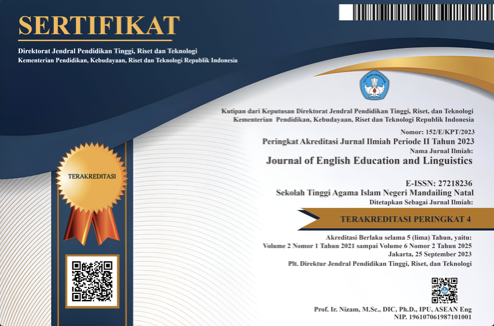Linguistic Swearing of Mobile Legend Players: A Pragmatic Study
DOI:
https://doi.org/10.56874/jeel.v4iJournal%20of.1324Abstract
Swearing has traditionally been considered an inappropriate use of language, but numerous people continue to swear in formal and informal circumstances, like a mobile legend player. The presence of swear words in different societies and languages shows that this intriguing and multifarious language phenomenon has been prevalent in real-life discourse (Dynel, 2012). The study investigated the uses and meanings of mobile legend players' swearing behavior in Ghost Wreckers content videos. The transcription was run through Antconc, which also served as the main instrument of the study as it is mainly used in Corpus Linguistics. In the data analysis, numerous swear words were discovered in the game, which appeared to be influenced by the opponents and by the nature of the game. Ultimately, this investigation illustrates that swearing is not always unpleasant but also linguistically meaningful. Likewise, mobile legend players swearing behavior tend to perform various pragmatic functions to express emotions descriptively, abusively, cathartically, emphatically, and idiomatically. This data cements the idea that Mobile Legend is a competitive online game that stimulates raging emotions, a high level of competitiveness, and a firm hold on players' focus that causes them to express their excitement, frustrations, and joy during a game.
Downloads
Published
Issue
Section
License
All articles published in the Journal of English Education and Linguistics are licensed under a Creative Commons Attribution-ShareAlike 4.0 International (CC BY-SA) license. This means anyone is free to copy, transform, or redistribute articles for any lawful purpose in any medium, provided they give appropriate attribution to the original author(s) and Journal of English Education and Linguistics, link to the license, indicate if changes were made, and redistribute any derivative work under the same license.
Copyright on articles is retained by the respective author(s) without restrictions. A non-exclusive license is granted to the Journal of English Education and Linguistics to publish the article and identify itself as its original publisher, along with the commercial right to include the article in a hardcopy issue for sale to libraries and individuals.
Although the conditions of the Creative Commons Attribution-ShareAlike 4.0 International (CC BY-SA) license do not apply to authors (as the copyright holder of your article, you have no restrictions on your rights), by submitting to the Journal of English Education and Linguistics, authors recognize the rights of readers and must grant any third party the right to use their articles to the extent provided by the license.

This work is licensed under a Creative Commons Attribution-ShareAlike 4.0 International License.








